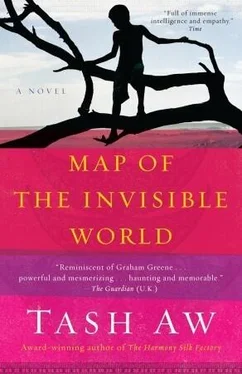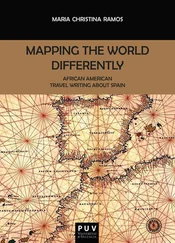Tash Aw - Map of the Invisible World
Здесь есть возможность читать онлайн «Tash Aw - Map of the Invisible World» — ознакомительный отрывок электронной книги совершенно бесплатно, а после прочтения отрывка купить полную версию. В некоторых случаях можно слушать аудио, скачать через торрент в формате fb2 и присутствует краткое содержание. Год выпуска: 2010, Издательство: Spiegel & Grau, Жанр: Современная проза, на английском языке. Описание произведения, (предисловие) а так же отзывы посетителей доступны на портале библиотеки ЛибКат.
- Название:Map of the Invisible World
- Автор:
- Издательство:Spiegel & Grau
- Жанр:
- Год:2010
- ISBN:нет данных
- Рейтинг книги:4 / 5. Голосов: 1
-
Избранное:Добавить в избранное
- Отзывы:
-
Ваша оценка:
- 80
- 1
- 2
- 3
- 4
- 5
Map of the Invisible World: краткое содержание, описание и аннотация
Предлагаем к чтению аннотацию, описание, краткое содержание или предисловие (зависит от того, что написал сам автор книги «Map of the Invisible World»). Если вы не нашли необходимую информацию о книге — напишите в комментариях, мы постараемся отыскать её.
comes an enthralling novel that evokes an exotic yet turbulent place and time—1960s Indonesia during President Sukarno’s drive to purge the country of its colonial past. A page-turning story,
follows the journeys of two brothers and an American woman who are indelibly marked by the past — and swept up in the tides of history.
Map of the Invisible World — читать онлайн ознакомительный отрывок
Ниже представлен текст книги, разбитый по страницам. Система сохранения места последней прочитанной страницы, позволяет с удобством читать онлайн бесплатно книгу «Map of the Invisible World», без необходимости каждый раз заново искать на чём Вы остановились. Поставьте закладку, и сможете в любой момент перейти на страницу, на которой закончили чтение.
Интервал:
Закладка:
“It was a simple mistake. Nine out of ten people would have reacted as I did.”
“Really?” Margaret reached for a piece of paper that lay on a messy pile on the floor beside her. “Listen to this. Your latest report — destined, I see, for the nether pages of the South China Morning Post: ‘Jakarta, 15 August 1964. Indonesia is falling slowly into the grip of civil war. Sukarno’s government is lumbering ominously toward its Aegospotami, and there are many who are ready to play Lysander to his Athenian fleet….’ I mean, honestly, Mick, who the hell is going to read this nonsense? We’re living in 1964. We send men into space. We don’t live in city-states drinking wine from urns and practicing boy love. Jesus! The only reason you get any work at all is because of your passport. With all the Brits and Americans kicked out there’s only you Aussies and a couple of Frenchmen left — and still you can’t make a name for yourself.”
Mick did not answer; in the uneven light the contours of his face deepened, and Margaret could not be sure if he was grinning or grimacing. “Shouldn’t we just concentrate on finding Adam, rather than discussing my shortcomings?”
Margaret nodded. “I’m sorry.” Adam’s face came to her again and she tried to picture how he would look when he finally returned — tired and slightly bemused at her concern. It was all a misunderstanding, he would say. I’m all right, I just went for a walk and got lost.
But no: However positive she tried to be, she knew that he had gone, and that she was responsible. This city was defeating her.
She looked around the sparsely furnished room. There was another bowl-shaped rattan chair and a small armchair, which Mick occupied, the stoutness of his frame making it seem like a piece of children’s furniture. There was no table, no cabinet — nothing in which to store the various objects that lay scattered across the floor like the aftermath of an amateurish burglary: two pairs of sneakers, a badminton racket and three worn shuttlecocks, files, heaps of books, a broken radio, a postcard of Hobart’s “beautiful waterfront” and a porcelain dish painted with the face of a very young Chairman Mao, which Mick had used as an ashtray. On the inelegant bookshelves, propped up against some paperback novels, there was a photo of Mick as a child, age four or five, dressed in a tweed jacket and striped tie, seated on a bicycle. His mother was bending over to hold on to the handlebars, her head tilted up toward the camera. Though she was a heavy woman, her features were fine, almost fragile, with an aquiline nose and narrow dark eyes that belonged to antique, Oriental lands — a kinder, gentler world, Margaret thought. Her wavy hair was brushed to one side and held with a small clip, and her dress was austere and black, the kind of thing she looked too young to wear.
“I think she was Ottoman Turk,” Mick said. “My father was always saying she wasn’t pure Greek. It was their little joke, something he always teased her about — though the whole Greek thing didn’t ever mean much to me when I was growing up in the suburbs of Melbourne. My father wasn’t a thin man either, so you see, I’m destined for obesity.”
Margaret laughed. “There you go again, blaming everything on others.”
“At least I’m predictable. Listen, you should get some rest. You’ve had one hell of a day. Adam will turn up tomorrow, I’m sure.”
Margaret forced herself out of the chair. Her back felt very stiff all of a sudden. “I’m sure he’s safe and sound with Din, doing what ever young men do in this city nowadays. I’m just, I don’t know, overreacting, I suppose. This whole place is going crazy and I can’t read what’s happening. I’ve lost touch, Mick. I just don’t have it anymore.” She was glad the light was so dim; she knew she looked worn, and she did not want him to see her like this. She pulled at her skirt, trying to straighten it; she wished it were longer, that it reached all the way down to her ankles like a chaste Muslim robe.
“You know what? You should be doing my job and I should be doing yours — you’re good at putting yourself in danger, and I’d be very good sitting in an office doing aimless research.”
“Good night, Mick. See you tomorrow. Not too early. Let’s give ourselves a break.”
“Margaret,” he called out abruptly. For a moment she thought that maybe he did not want her to leave, that he did not want to be alone. “I managed to find some news. On Karl. It wasn’t easy. And I had to be inventive and think about how to get information that no one else could get — just as you told me to. You’d be proud of me—”
“Mick, just tell me.”
“I’m afraid it’s not good.”
IN THE LATTER half of the eighteenth century the European population of Batavia began to move southward, away from the now cramped and unsanitary old fort on the coast, in search of better living conditions. They moved beyond the malarial swamps and the poorly drained stretch around Jacatraweg and eventually settled in an elegant suburb of sturdy white houses with colonnaded galleries, built along tree-lined avenues and pleasant open spaces. They called it Weltevreden: to be contented . The development of Weltevreden coincided with the sharp rise in Dutch military activity in the East Indian archipelago during the first decades of the nineteenth century, boosted by the arrival of Governor-General Daendels, whose nickname, the Iron Marshal (or the Thunder Lord, or any of the half dozen names by which he is known to Indonesian schoolchildren), gives some idea as to Dutch attitudes of the time. Under Daendels’s rule, Weltevreden saw the construction of military barracks and houses with neo classical facades for high-ranking army officers and civil servants. Enormous new administrative buildings were constructed using the stones from the dismantled fort, and lavish celebrations were held at the army club (called, one can only assume ironically, the Concordia). Each time a new island in the Indonesian archipelago was conquered, or whenever a Javanese prince submitted his lands to Dutch rule, appropriate celebrations would be held — an open-air concert, per haps, where bands would play French operettas and finely dressed Europeans would drive up in their carriages and form a wide circle around the musicians, presaging the drive-in movie theaters that would one day exist in this part of central Jakarta. At the heart of Weltevreden lay a pure green space, one square kilometer: Koenigsplein; at various times a racecourse, a pleasure ground, and a military training ground. The whole of Utrecht would fit in it, the Dutch would say, laughing, as they passed the square on their way to drinks at the Harmonie Club or a play at the Schouwburg.
There were, of course, setbacks in this happy existence. Soldiers would return gravely wounded from the bloody guerrilla war in Aceh; they would be sent to recuperate in the great army hospital that stood on the edge of Koenigsplein, an ever-present reminder to the inhabitants of Weltevreden of the true nature of their lives in the East Indies. Some were foolhardy young men who were fond of saying that the greatest enemy in the Indies was boredom, but the truth was that there were many ways to die in the Indies; death lurked in the shadows, often well-disguised. If you were a white man there was only one thing to do: make as much money as you could and get back to Europe as quickly as possible. This is what older, wiser men said to themselves as they went past the hospital, whispering a silent prayer of thanks. Today the emptiness of Koenigsplein has been replaced by the emptiness of Merdeka Square; everything else has been swallowed up by the sprawl of Jakarta, but the hospital still stands.
“Please, we are family members,” Margaret said to the nurse, who was finally beginning to relent; she reached for the key to the drawer and unlocked it, but seemed reluctant to pull it open. She stood behind the counter, staring at Margaret through thick black-rimmed glasses that made her eyes look bulbous and confused. She was about fifty, no taller than Margaret but strongly built. Her scratched, fuzzy badge announced her name and position: CANTIK HARTONO, SENIOR NURSE. Sensing that Cantik’s resolve was weakening, Margaret subtly pressed home her advantage. “Ibu Cantik, please don’t think of us as impolite,” she said, bowing slightly, “we seek only your kindness and your help.” A whole lifetime in Asia had taught her to back off in order to get what she wanted: If you insist too strongly you will cause embar rassment, and embarrassment leads to refusal, and refusal in Asia is irreversible, for about-turns involve loss of face, tantamount to humiliation. Therefore never be too (overtly) forceful; never insist, always suggest. Read body language. Smile. Bow. Do not overreact. Be humble. Acknowledge your foreignness. These were the simple rules by which Margaret had successfully lived in Asia, and they were proving effective once more. She turned to look at Mick, who was reaching into his shirt pocket, nervously feeling for his cigarettes. She shook her head slightly and frowned; his hand fell from his chest and hung limply by his side, fingerstips rubbing together lightly as if playing with grains of fine sand.
Читать дальшеИнтервал:
Закладка:
Похожие книги на «Map of the Invisible World»
Представляем Вашему вниманию похожие книги на «Map of the Invisible World» списком для выбора. Мы отобрали схожую по названию и смыслу литературу в надежде предоставить читателям больше вариантов отыскать новые, интересные, ещё непрочитанные произведения.
Обсуждение, отзывы о книге «Map of the Invisible World» и просто собственные мнения читателей. Оставьте ваши комментарии, напишите, что Вы думаете о произведении, его смысле или главных героях. Укажите что конкретно понравилось, а что нет, и почему Вы так считаете.












